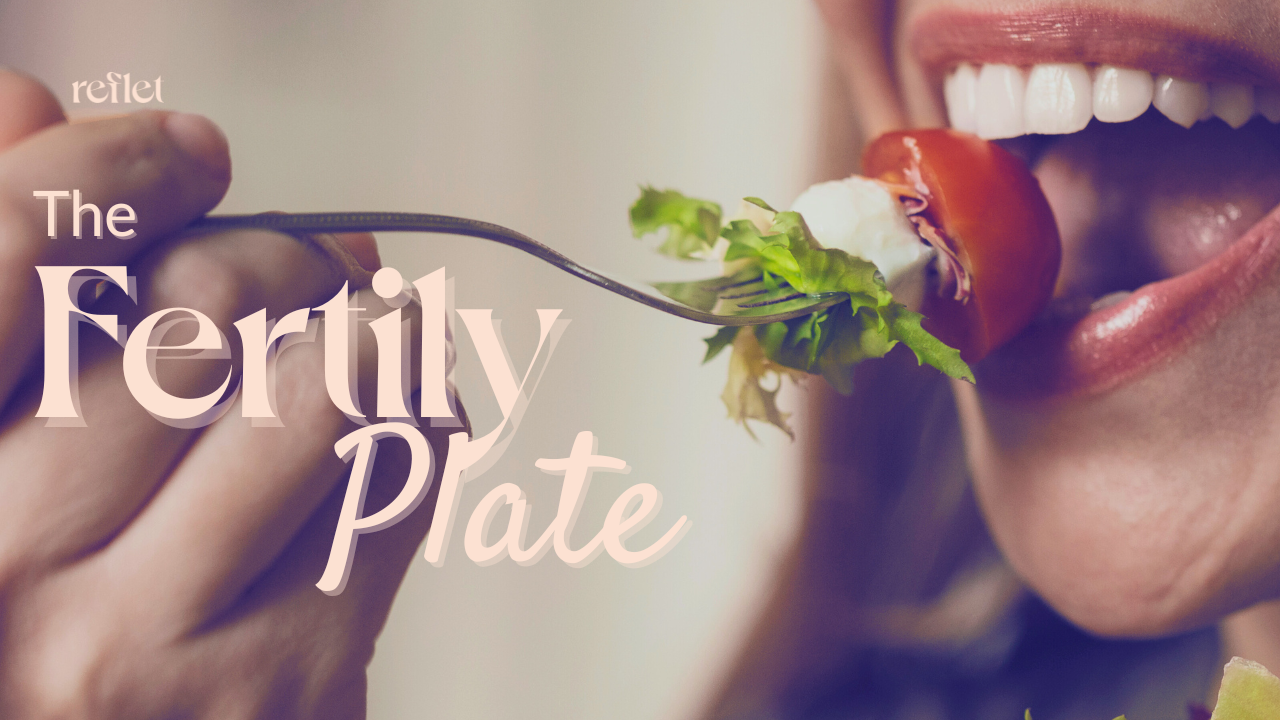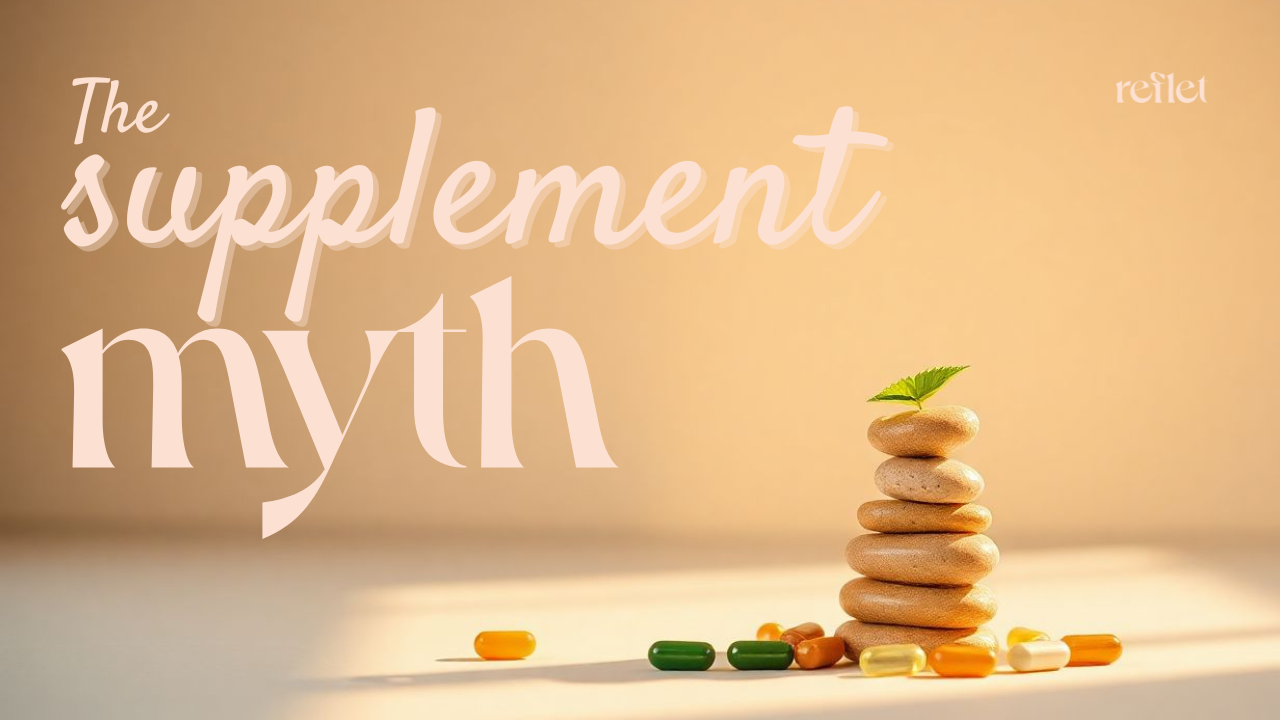Support oocyte freezing
Finally, let's talk about this taboo subject that concerns us all: oocyte freezing. Many women ask themselves the question, but what is the real situation, how to get support and what are the risks?


Melisande
Founder of Reflet
Entrepreneur for 7 years, committed to women's health and with a single desire: to have a positive impact on women!
They support us





Adopt an ideal diet for fertility when you want to get pregnant or freeze your eggs
Fertily Diet is for you if:
✅ You Try to Get Pregnant ;
✅ You are considering Make a Baby Within a Year ;
✅ You Galerez to get pregnant;
✅ You want Freeze your oocytes ;
✅ You Are you ready To incorporate concrete recommendations now.
One Consulting costs an average of €70. Fertily Diet is cheaper, accessible immediately, and above all full of practical and scientifically validated recommendations to optimize your fertility.
If you are here it is probably because you are considering egg freezing. Whether for medical reasons or because you are getting older, it is very healthy to ask yourself the question so for that, congratulations! This is a subject that is still little talked about, but since the biggest factor in infertility is age, egg freezing should be much more popular. It is not that all women should freeze their eggs, but all women should be informed about the possibility of doing so and the importance of asking themselves the question. And like all other topics related to fertility, freezing your oocytes in an optimal way can be supported by multidisciplinary experts. They can be a support both to explain the risks, to understand what motivates you to do this process or to increase the quality of your oocytes at the time of the puncture and therefore improve your long-term fertility. Since a global approach is key in our opinion, we bring you, in addition to the advantages of a multidisciplinary approach, a factual vision of things. We are seriously looking at the facts: what do the statistics say about egg freezing?
find a specialistWhat is the percentage of success of a pregnancy after egg freezing?
Oocyte freezing (or vitrification) preserves its fertility potential, but its The chances of success vary greatly depending on the age at the time of the puncture. Data from international scientific societies shows that oocyte quality naturally decreases over time, which has a direct impact on the results of future IVF using these frozen oocytes. If we share this data, it is to make you aware of the importance of asking yourself the question seriously as soon as possible, our goal being to allow you to become an actor in the preservation of your fertility.
What factors influence the chances of success?
- Age at time of freezing (most decisive factor)
- Number of frozen oocytes
- Oocyte quality at the time of the puncture
- Oocyte survival rate after thawing
- Quality of sperm used at the time of fertilization
- Uterine health during embryo transfer
The data below are based on reference clinical studies (Cobo et al., 2018; Doyle et al., 2016) and validated by ESHRE (European Society of Human Reproduction and Embryology).
What are the success rates by age?
Freezing oocytes preserves fertility, but Not all vitrifications lead to pregnancy. The most decisive factor isage at the time of sampling, followed by Number of frozen oocytes.
These numbers represent the Probability of having a live birth (sorry for the term “live birth” that's hard to read, it's the term used in all scientific studies) from frozen, thawed, fertilized and then transferred oocytes.
Detail by age group according to the number of frozen oocytes
How many oocytes should you freeze ideally?
ESHRE recommends a number differentiated according to age, to maximize the chances of a future pregnancy:
Note: the number of oocytes obtained depends on the ovarian reserve and the stimulation protocol. Some women will need several puncture cycles to reach that number. At Reflet, we are exploring the possibility of freezing oocyte cells as naturally as possible.
The limits of oocyte freezing
- It is not No baby insurance : even with frozen oocytes, several steps remain necessary such as successful fertilization, good embryonic development, and implantation in the uterus;
- It is not Not a biological stoppage of time : the quality of the uterus and general health continue to evolve with age, which is why it is important to have a good overall lifestyle and to be accompanied by experts in their field (naturopath, dietitian, etc.) to increase initial oocyte quality and maintain a healthy lifestyle;
- It is not not always taken care of (except for medical reasons such as cancer). The cost may vary from 2,000 to 4,000€ per cycle, not including annual preservation or future IVF.
According to ESHRE, the optimal age to consider egg freezing is between 28 and 34 years. At this age, the chances of pregnancy from frozen oocytes are raised with a single cycle, which limits costs and interventions. Beyond the age of 35, freezing is still possible but often requires more oocytes, so more cycles to compensate for the drop in quality.
In all cases, an oocyte freezing process must be done hand in hand with your gynecologist. Consulting other multidisciplinary practitioners is an additional recommendation to increase your chances and live this journey well physically and mentally.
What support can a midwife offer during egg freezing?
Egg freezing is still a recent medical procedure for many women, often experienced as an intimate, preventive and sometimes emotionally charged decision. In this context, midwives can play a valuable role in informing, listening and coordinating, even if their involvement is still little known to the general public.
What can a midwife offer in the context of oocyte freezing?
Trained in reproductive health in all its dimensions, midwives can intervene at various points in the oocyte freezing process, in particular to:
- Informing and deciphering the medical steps : functioning of the cycle, ovarian stimulation, puncture, anesthesia, freezing...
- Provide emotional support : responding to doubts, coping with stress or the feeling of isolation sometimes associated with this process.
- Track the body and the cycle : depending on the case, it can offer general health monitoring (weight, tension, pelvic pain, digestion, side effects).
- Preparing a possible sequel : reappropriation of the body, support for the natural cycle, referral to other professionals if future pregnancy plans.
In which cases should you consult?
- Before freezing, for ask questions outside of a purely medical framework and to take more time than with your gynecologist;
- During the protocol, for managing physical or emotional discomforts,
- Or after, for resume a natural gynecological follow-up, reconnect with your cycle, or talk about what's next.
Midwives often take more time than gynaecos, they are an asset in putting this approach into a global approach to your health and allowing you to have a place where you can take your time and listen.
How can food influence the quality of oocytes before freezing?
Oocyte quality is an essential parameter in an oocyte freezing process. Although it is largely determined by age, some lifestyle factors, especially diet, can play a modulatory role. In this context, the support of a dietitian can make it possible tooptimize the metabolic and antioxidant environment before ovarian stimulation.
How can diet have an impact on oocyte quality?
The objective of nutritional monitoring in this context is not to “boost fertility” at all costs, but to:
- reduce low-grade inflammation, often linked to an ultra-processed diet,
- improve the antioxidant profile of the cellular environment, to protect the oocytes,
- support hormonal balance and insulin sensitivity,
- avoid deficiencies in key nutrients such as zinc, selenium, vitamins B, C, D, E, or omega-3.
A dietitian will be able to offer individualized support, taking into account cycles, weight, oxidative stress and possible associated pathologies (PCOS, endometriosis, etc.).
What are the statistics on the links between nutrition and oocyte quality?
- One scientific review (Ruder et al., 2008) points out that a diet rich in antioxidants, essential fatty acids, and low in refined sugars may contribute to improving oocyte quality and the response to stimulation.
- A study (Gaskins et al., 2014) conducted on women undergoing IVF showed that a Mediterranean-type diet (rich in vegetables, fish, vegetable oils) was associated with better embryonic results.
- A publication (Chavarro et al., 2007) shows that processed fats and refined sugar are associated with a decrease in ovulatory fertility, which could indirectly influence oocyte quality.
Food does not change the age of the oocyte, but it can clearly influence:
- The quality of the cellular environment,
- the ovarian response to stimulation,
- and Physical recovery after puncture.
A dietitian specializing in hormonal health can support this stage in a personalized, natural way, and complementary to the medical protocol.
Can osteopathy prepare the body for egg freezing?
Egg freezing involves hormonal stimulation followed by an ovarian puncture, a protocol that intensively mobilizes the body and the hormonal system. In this context, some women choose to be accompanied by an osteopath to prepare their body in a global and non-invasive way. Even if there are no specific scientific studies on the subject, osteopathy can be a interesting additional support.
What can osteopathy do before oocyte freezing?
Osteopathy is based on the idea that a body in structural and functional balance promotes better adaptation to changes. Before oocyte freezing, the osteopath can work on several axes:
- Releasing pelvic tensions (uterine ligaments, ovaries, pelvis);
- Improve the Diaphragm mobility and blood flow to the reproductive organs;
- Accompany the digestive, lower back, or pelvic pain often present during periods of stimulation;
- Promote a better recovery after the puncture, by relieving post-intervention tensions.
The approach is gentle, individualized, and always non-intrusive. It adapts to the cycle and to the stage of the protocol, in coordination with the medical team if possible.
Even in the absence of direct scientific data concerning oocyte freezing, osteopathy can help:
- prepare the physical and tissue terrain before stimulation,
- relieve some discomforts during the protocol,
- support a better body perception and overall relaxation, precious in a journey that is sometimes anxiety-provoking.
Useful support for those who want to experience this process in a more global, natural and connected way to their body.
Can acupuncture improve oocyte quality?
Since you are asking yourself the question of oocyte freezing, being interested in their quality and wondering whether it is possible or not, increasing this quality is also key. Some women turn to acupuncture to optimize their chances before a puncture and also to welcome this stage as calmly as possible. But can this practice really improve oocyte quality? Two recent studies suggest a potential for positive impact, but with caution in interpretation.
Acupuncture and oocyte quality: an action on the hormonal and circulatory fields
In traditional Chinese medicine, oocyte quality is linked to the vitality of the “Jing” (vital essence) stored in the kidneys, and to a good flow of blood and energy to the ovaries. Acupuncture therefore works to:
- improve ovarian microcirculation,
- reduce oxidative stress markers,
- support follicular maturation,
- optimize ovarian response before stimulation,
- and preparing the body for a better quality oocyte puncture.
Acupuncture and oocyte freezing: what does the research say?
It does not exist no strong medical consensus yet on the direct link between acupuncture and oocyte quality, but some well-constructed studies open up interesting paths.
- Song, J. et al. (2023) : this randomized study conducted on women over 38 years of age shows that acupuncture performed during an IVF protocol Improve the morphology and vitality of the oocytes collected, with a better maturation rate (MII).
- Stephan, J.M. (2011) : in this French publication, the author highlights the effect of acupuncture on ovarian vascularization and follicular function, in connection with better oocyte quality observed in clinical practice. It has a better hormonal profile andoocytes of more homogeneous quality, according to puncture feedback in monitored patients.
No studies have shown irrefutably That acupuncture increases oocyte quality in a systematic way, but it seems act on favorable factors to this quality: circulation, hormonal balance, response to ovarian stimulation.
This is an approach to consider in a global approach to fertility preservation, especially before a freeze or an IVF cycle, but it's not a magic formula! It must be part of global support and can help reduce stress.
Why consult a psychologist before or during an oocyte freezing process?
Deciding to freeze your oocytes is often much more than a medical procedure. It is an intimate decision, sometimes heavy, that touches on personal, social, identity and emotional dimensions. In this context, psychological support can play an essential role, whether before, during or after the protocol and whether it is done by a psychologist or another professional dedicated to emotional support. Indeed, as psychologists are in high demand, experts in emotional support (sophrologist, psychopractitioner, etc.) who are sensitive to issues related to fertility can also be a major asset in the process of oocyte preservation.
In which cases should you consult a psychologist or a psychopractitioner?
Each woman experiences this journey differently. Going to a psychologist does not mean going bad, but take space to clarify, file and support this approach that can call into question stages of life or make you aware of certain buried things. A psychologist or other professional dedicated to emotional support in an oocyte freezing process can help you:
- Explore your motivations : why now? For whom? For what?
- Dealing with social, family or professional pressure related to this personal choice;
- Accompanying emotions related to stimulation, waiting, or puncture;
- Relieve body tensions or feelings of dissociation, sometimes triggered during the protocol,
- Managing the questions of the “maternity project”, which is obviously a subject for the patient's future.
An emotional support specialist will allow you to express yourself in a confidential and non-judgmental space in order to promote a better understanding of yourself and your choices, while evaluating and adjusting these decisions as needed. The aim is also to deconstruct certain injunctions such as those related to age, the biological clock or the pressure to succeed, in order to allow this stage to be lived with reinforced emotional stability. The aim? Help prepare for the rest of the journey, whether the desire for motherhood is immediate or not.
How can hypnosis help in an oocyte freezing process?
An oocyte freezing process is obviously medical, but it also involves reflection and emotional commitment. In this context, Hypnosis can be a valuable complementary approach to support stress, blockages, fears or physical feelings related to the preservation protocol.
What can hypnosis contribute to the preservation process?
Hypnosis allows a altered state of consciousness in which the mind is more receptive to certain positive suggestions. The objective is not to control the body, but to accompany it in a state of relaxation, confidence and refocusing. Before or during oocyte freezing, hypnotherapy can:
- ease anticipatory stress or anxiety, often linked to injections, punctures or medical conditions,
- work on the unconscious fears or ambivalences around fertility and the future,
- improve physical tolerance at certain stages of the protocol (pain, tension, disturbed sleep),
- Strengthen a sense of alignment and inner clarity in a decision that is sometimes complex to make alone.
Some practitioners also train their patients in self-hypnosis in order to integrate the benefits of letting go more daily.
What is the ideal time to practice hypnosis in an oocyte freezing process?
- Upstream of the process to create a state of calm before stimulation, or to set an intention around the d
- Between two stages the protocol to regulate the mind and support the body,
- After the puncture, to facilitate emotional and physical recovery.
The work can be one-off or spread over several sessions, depending on the woman's needs and her personal experience.
Hypnosis does not affect oocyte quality or medical results, but it can play a key role in the emotional experience of the journey; it remains essential to consult a professional who is sensitive to this subject who can understand the questions surrounding this choice of fertility preservation.
.webp)
Our themes
.png)

.png)










.png)

